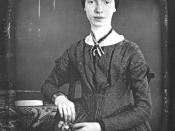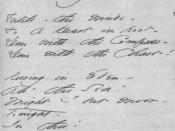The poem "Because I Could Not Stop for Death" by Emily Dickinson expresses the speaker's reflection on death. The poem focuses on the concept of life after death. This poem's setting mirrors the circumstances by which death approaches, and death's ton appears kind and compassionate. It is through the promise of immortality that fear is removed, and death not only becomes acceptable, but welcomed as well. As human beings, we feel that death never comes at a convenient or opportune time. When Dickinson says, "Because I could not stop for Death," she causes the reader to ask why she could not stop. The obvious answer is that she was so wrapped up in her own life that she did not think about death. She makes it clear that it is inescapable, though, when she says, "He kindly stopped for me." The next lines, "The Carriage held but just Ourselves-/And Immortality," signify that the miracle of life is our most precious possession and promises the gift of unending life.
Immortality's presence helps to remove fears as we exit the physical world and provides the recipient with the necessary assistance to assure that the transition from reality to spirituality is a pleasant experience. If the promise of immortality did not exist, one would never go along willingly, nor would one welcome death without fear. Death and the speaker ride along with absolutely no concept of the passage of time. They are not hurried, as they have forever to reach their destination. This is stated in the line "We slowly drove-/He knew no haste." Having completed all her earthly chores, the speaker states that they are no longer of any concern to her. Now there is no sewing, cooking, cleaning, farming, or caring for loved ones. The speaker has been allowed...


